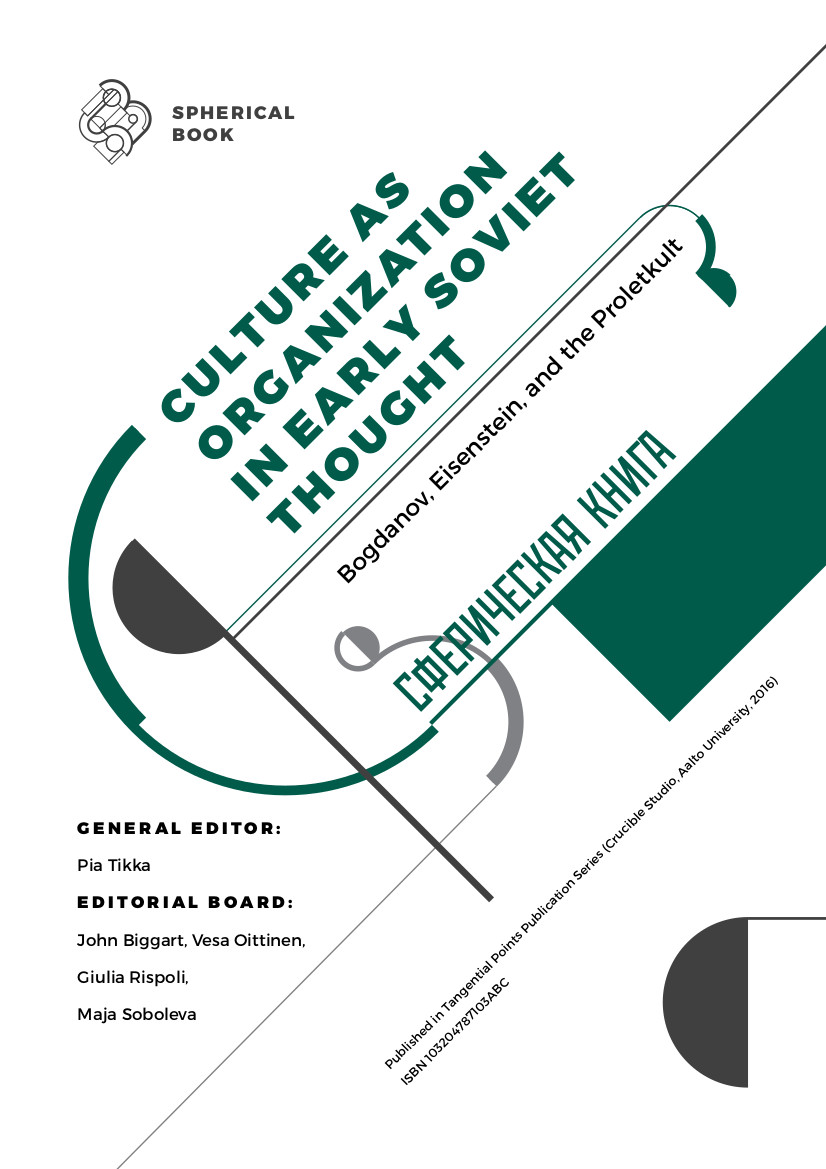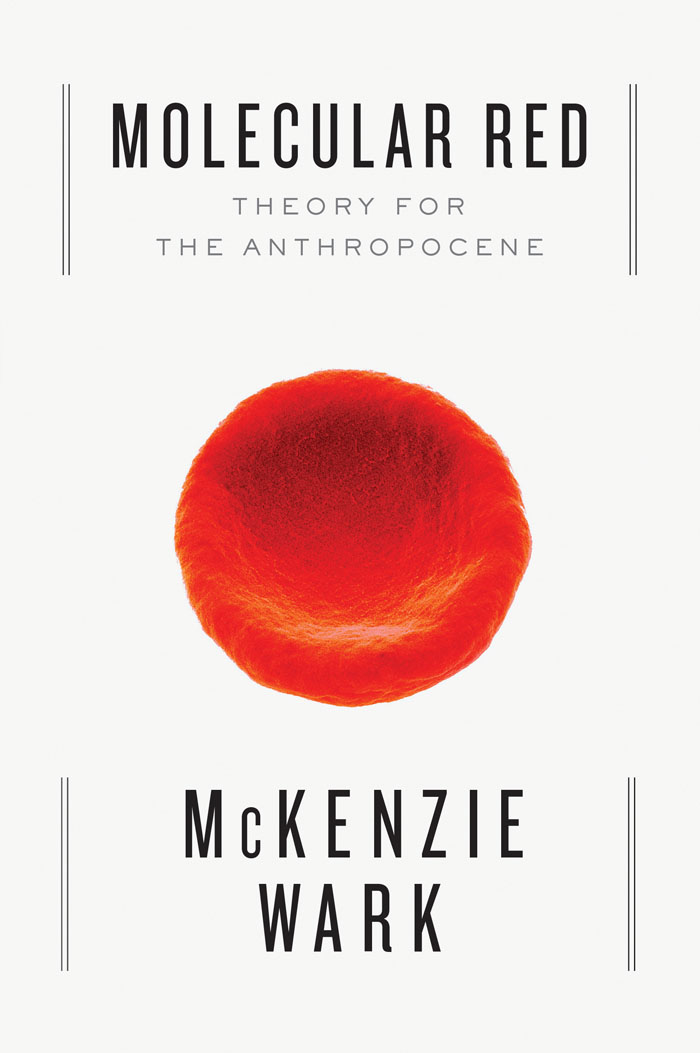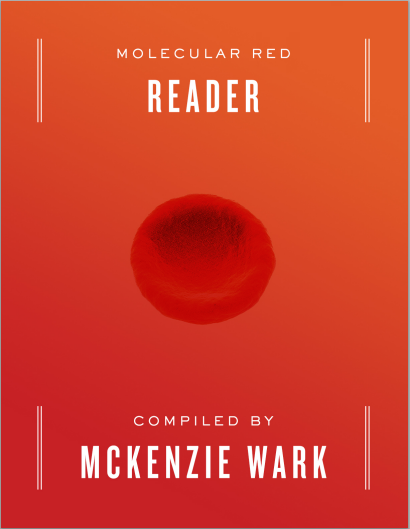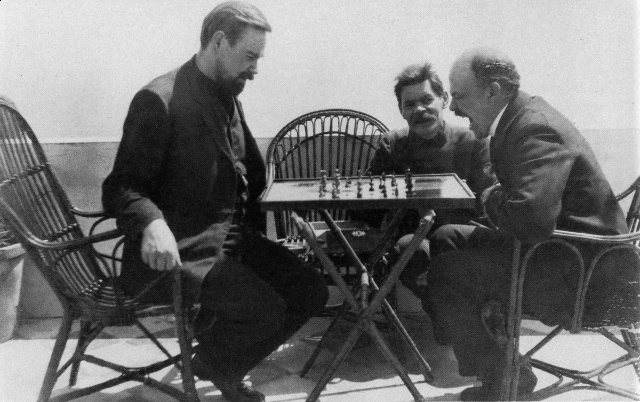Culture as Organization in Early Soviet Thought: Bogdanov, Eisenstein, and the Proletkult (2016)
Filed under book, spherical book | Tags: · cinema, film, film theory, montage, philosophy, proletkult, russia, systems theory, tektology, theory

“This anthology brings together a group of film researchers, historians, political scientists and systems scientists to discuss historical and contemporary tangential points between the sciences and the arts in Russia during the first decades of the twentieth century. All chapters provide new insights into linkages between the arts, philosophy and other disciplines during this period. Tangential points between early Russian systems thinking and approaches to montage that were being developed within the film community are examined in detail. The contributing authors focus on two thinkers: the filmmaker, Sergei M. Eisenstein and the systems theorist, Aleksandr A. Bogdanov.”
The book is published in an interactive format inspired by Eisenstein’s idea of the “Spherical Book”, organising chapters in a thematic modular way, allowing for multiple reading perspectives.
Edited by Pia Tikka, with John Biggart, Vesa Oittinen, Giulia Rispoli, and Maja Soboleva
Publisher Aalto University School of Arts Design and Architecture, Helsinki, 2016
Tangential Points series
ISBN 9789526000763
McKenzie Wark: Molecular Red: Theory for the Anthropocene (2015)
Filed under book | Tags: · agriculture, anthropocene, climate, climate crisis, communism, cyborg, environment, knowledge, labour, literary criticism, marxism, nature, philosophy, production, proletariat, proletkult, revolution, science, science fiction, technoscience, tektology, theory, utopia


“In Molecular Red, McKenzie Wark creates philosophical tools for the Anthropocene, our new planetary epoch, in which human and natural forces are so entwined that the future of one determines that of the other.
Wark explores the implications of Anthropocene through the story of two empires, the Soviet and then the American. The fall of the former prefigures that of the latter. From the ruins of these mighty histories, Wark salvages ideas to help us picture what kind of worlds collective labor might yet build. From the Russian revolution, Wark unearths the work of Alexander Bogdanov—Lenin’s rival—as well as the great Proletkult writer and engineer Andrey Platonov.
The Soviet experiment emerges from the past as an allegory for the new organizational challenges of our time. From deep within the Californian military-entertainment complex, Wark retrieves Donna Haraway‘s cyborg critique and science fiction writer Kim Stanley Robinson’s Martian utopia as powerful resources for rethinking and remaking the world that climate change has wrought. Molecular Red proposes an alternative realism, where hope is found in what remains and endures.”
Publisher Verso, London and New York, March 2015
ISBN 1781688273, 9781781688274
xxiv+280 pages
Reviews: Slavoj Žižek (Verso 2015, Wark’s response), John Beck (Radical Philosophy 2015), Mark Rappolt (ArtReview 2015), Maria Chehonadskih (Mute 2015, Wark’s response), Two Grenadiers (2015), Pieter Vermeulen & Tom Chadwick (nY 2016), Jim Harper (LSE Review of Books 2016).
Commentary: Joe Guinan (Renewal 2015), Jernej Kaluža (Radio Student 2019, SL).
Video lecture (Concordia U, Apr 2015)
Publisher
WorldCat
See also Molecular Red Reader compiled by Wark (PDF).
Comment (0)Alexander Bogdanov: Tektology (1913–) [Russian, English]
Filed under book | Tags: · cognition, marxism, organization, philosophy, science, systems theory, tektology

Bogdanov playing chess with Lenin during a visit to Gorky on Capri, Italy, April 1908. (source)
Tektology is a term used by Alexander Bogdanov to describe a discipline that consisted of unifying all social, biological and physical sciences by considering them as systems of relationships and by seeking the organizational principles that underlie all systems.
Bogdanov’s work on tektology, published in Russia in two volumes in 1913 and 1917, anticipated many of the ideas that were popularized later by Norbert Wiener in Cybernetics and Ludwig von Bertalanffy in the General Systems Theory. There are suggestions that both Wiener and von Bertalanffy might have read the German edition of Tektology which was published in 1928. (from Wikipedia)
In Bogdanov’s philosophical endeavours there was one very important motive: from his point of view the philosophy of Marxism should be a philosophy of modern natural science and in this respect he acted in full accordance with Engels’ thesis that “with each epochal discovery, even in the natural-historical field, materialism should inevitably change its form.” (from the Foreword)
English edition
Publisher Intersystems Publications, Seaside/CA, 1980
265 pages
Russian edition
First published as The Universal Science of Organization (Tektologia), 1913-1917
This edition: Tektologia: Universal Organizational Science
Publisher Ekonomika, Moscow, 1989
303 and 352 pages
English edition
Foreword by Vadim N. Sadovsky and Vladimir V. Kelle
Edited with an Introduction by Peter Dudley
Translated by Vadim N. Sadovsky, Andrei Kartashov, Vladimir V. Kelle and Peter Bystrov
Publisher Centre for Systems Studies, University of Hull, 1996
ISBN 0859588769
322 pages
via Ken
Aleksandr Bogdanov and Systems Theory (Arran Gare, Democracy & Nature, 2000)
Against Social Determinism (McKenzie Wark, Public Seminar, 2013)
Essays in Tektology (English, trans. George Gorelik, 1980, added on 2013-12-23, via Marcell Mars)
Essays in Tektology, 2nd ed. (English, trans. George Gorelik, 1984, added on 2014-3-25, via Marcell Mars)
Тектология. Всеобщая организационная наука. том 1 (Russian, 1989, DJVU)
Тектология. Всеобщая организационная наука. том 2 (Russian, 1989, DJVU)
Bogdanov’s Tektology, Book 1 (English, trans. Vadim N. Sadovsky et al, 1996)
See Monoskop wiki for further writings of Bogdanov.
Comments (2)
